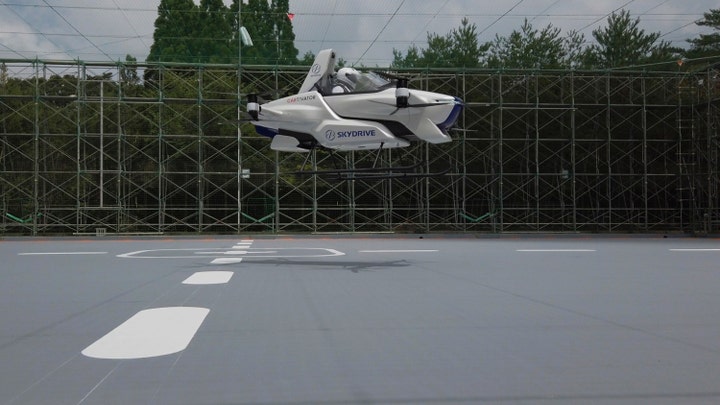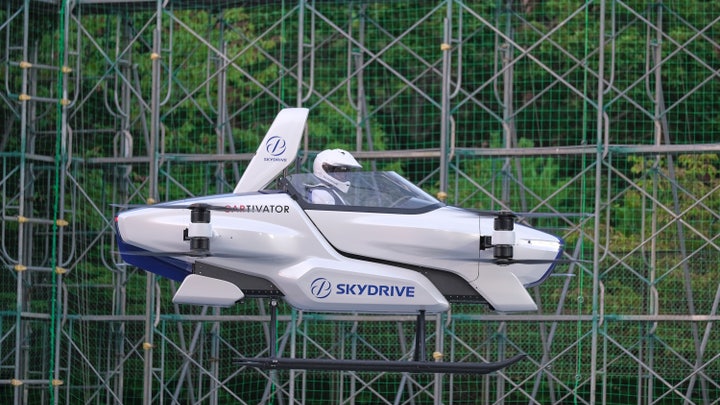W
WGAF
Banned
Active member
https://www.foxbusiness.com/technology/japanese-flying-car-successful-test-flight
A Japanese flying car project is one step closer to taking off into the mainstream.
SkyDrive Inc. announced Friday that it carried out a successful test flight with one person aboard, releasing images of a contraption with propellers lifted several feet off the ground that hovered in a netted area for four minutes.
“We want to realize a society where flying cars are an accessible and convenient means of transportation in the skies and people are able to experience a safe, secure, and comfortable new way of life,” the company’s CEO, Tomohiro Fukuzawa, said in a statement.

Fukuzawa says he hopes the car can be made into a real-life product by 2023, but he acknowledged that making it safe was critical.
“Of the world’s more than 100 flying car projects, only a handful have succeeded with a person on board,” he separately told The Associated Press. “I hope many people will want to ride it and feel safe.”
The machine so far can fly for just five to 10 minutes, but if that can become 30 minutes it will have more potential, including in the Chinese market, Fukuzawa said. The Japanese government is stressing the possibility of connecting remote areas and providing lifelines in disasters.
In the recent test, which was conducted Tuesday, a “pilot was at the controls but a computer-assisted control system helped ensure flight stability and safety while technical staff at the field monitored flight conditions and aircraft performance at all times as backup,” according to SkyDrive.

Unlike airplanes and helicopters, eVTOL ‒ or “electric vertical takeoff and landing” vehicles such as SkyDrive’s project ‒ offer quick point-to-point personal travel, at least in principle.
Yet battery sizes, air traffic control and other infrastructure issues are among the many potential challenges to commercializing them.
“Many things have to happen,” said Sanjiv Singh, professor at the Robotics Institute at Carnegie Mellon University, who co-founded Near Earth Autonomy, near Pittsburgh, which is also working on an eVTOL aircraft.
“If they cost $10 million, no one is going to buy them. If they fly for 5 minutes, no one is going to buy them. If they fall out of the sky every so often, no one is going to buy them,” Singh told the Associated Press.
The SkyDrive project began humbly as a volunteer project called Cartivator in 2012, with funding by top Japanese companies including automaker Toyota, electronics company Panasonic and video-game developer Bandai Namco.
A demonstration flight three years ago went poorly, according to the Associated Press. But the car has made progress since, and the project recently received another round of funding, of 3.9 billion yen ($37 million), including from the Development Bank of Japan.
A Japanese flying car project is one step closer to taking off into the mainstream.
SkyDrive Inc. announced Friday that it carried out a successful test flight with one person aboard, releasing images of a contraption with propellers lifted several feet off the ground that hovered in a netted area for four minutes.
“We want to realize a society where flying cars are an accessible and convenient means of transportation in the skies and people are able to experience a safe, secure, and comfortable new way of life,” the company’s CEO, Tomohiro Fukuzawa, said in a statement.

Fukuzawa says he hopes the car can be made into a real-life product by 2023, but he acknowledged that making it safe was critical.
“Of the world’s more than 100 flying car projects, only a handful have succeeded with a person on board,” he separately told The Associated Press. “I hope many people will want to ride it and feel safe.”
The machine so far can fly for just five to 10 minutes, but if that can become 30 minutes it will have more potential, including in the Chinese market, Fukuzawa said. The Japanese government is stressing the possibility of connecting remote areas and providing lifelines in disasters.
In the recent test, which was conducted Tuesday, a “pilot was at the controls but a computer-assisted control system helped ensure flight stability and safety while technical staff at the field monitored flight conditions and aircraft performance at all times as backup,” according to SkyDrive.

Unlike airplanes and helicopters, eVTOL ‒ or “electric vertical takeoff and landing” vehicles such as SkyDrive’s project ‒ offer quick point-to-point personal travel, at least in principle.
Yet battery sizes, air traffic control and other infrastructure issues are among the many potential challenges to commercializing them.
“Many things have to happen,” said Sanjiv Singh, professor at the Robotics Institute at Carnegie Mellon University, who co-founded Near Earth Autonomy, near Pittsburgh, which is also working on an eVTOL aircraft.
“If they cost $10 million, no one is going to buy them. If they fly for 5 minutes, no one is going to buy them. If they fall out of the sky every so often, no one is going to buy them,” Singh told the Associated Press.
The SkyDrive project began humbly as a volunteer project called Cartivator in 2012, with funding by top Japanese companies including automaker Toyota, electronics company Panasonic and video-game developer Bandai Namco.
A demonstration flight three years ago went poorly, according to the Associated Press. But the car has made progress since, and the project recently received another round of funding, of 3.9 billion yen ($37 million), including from the Development Bank of Japan.
